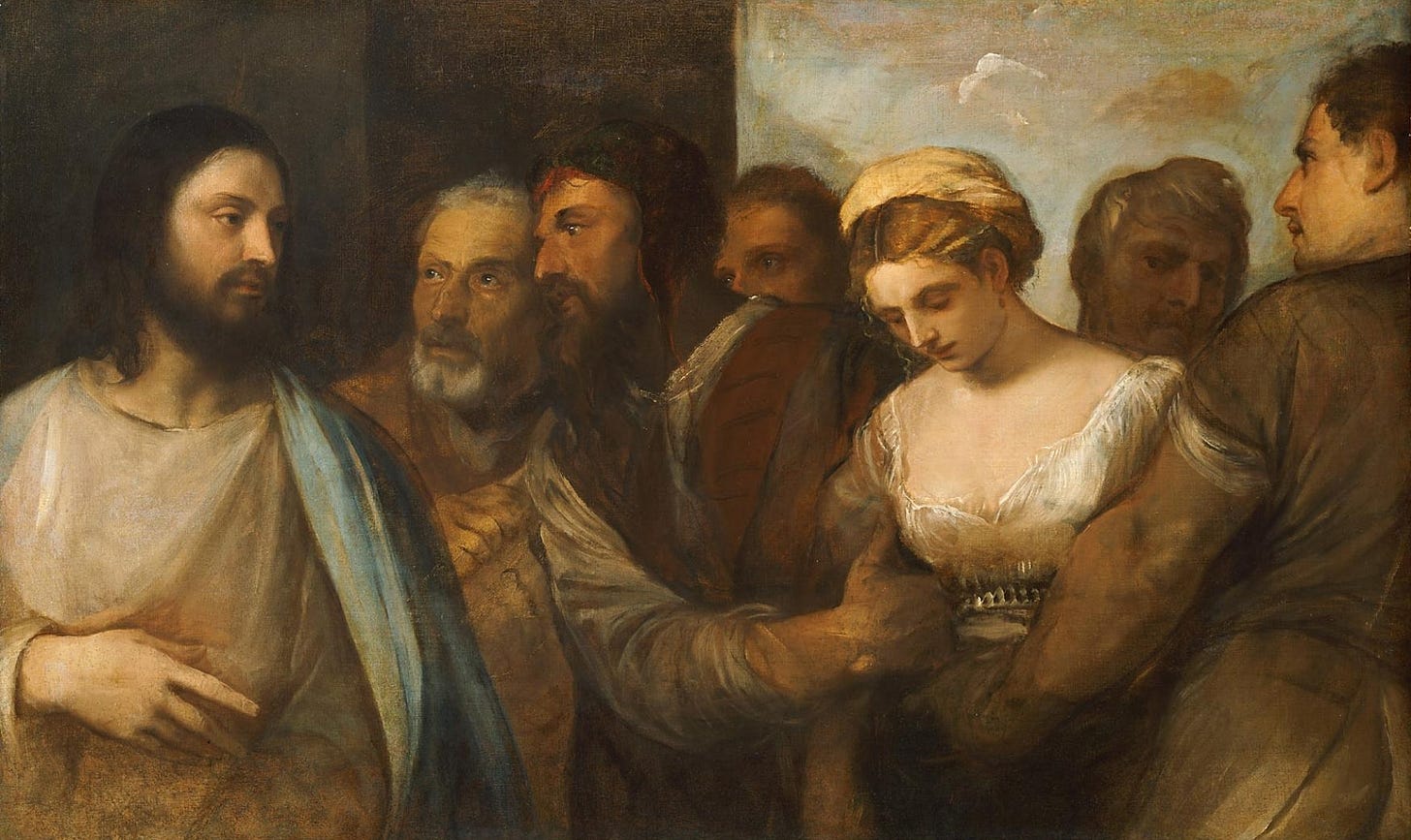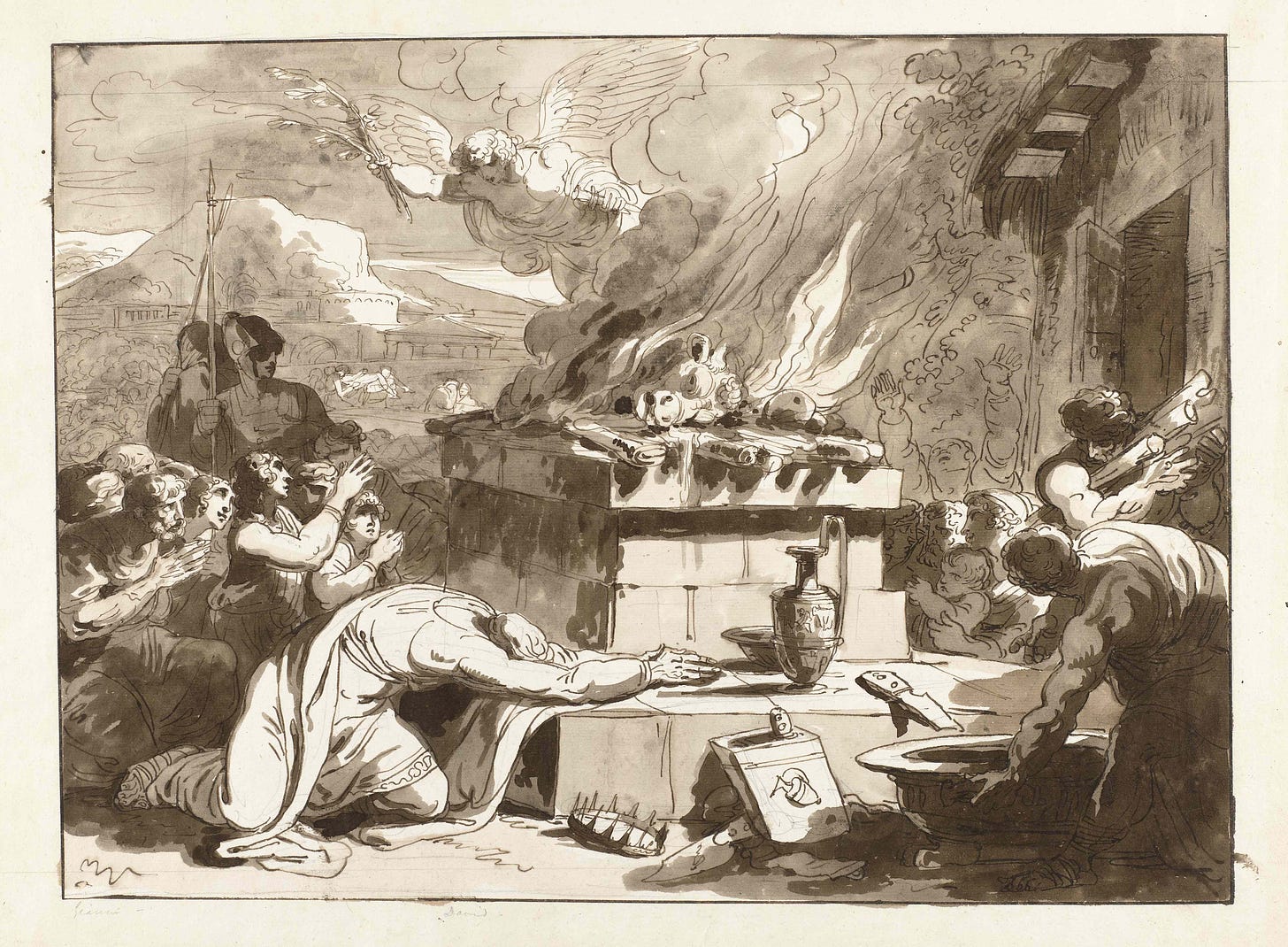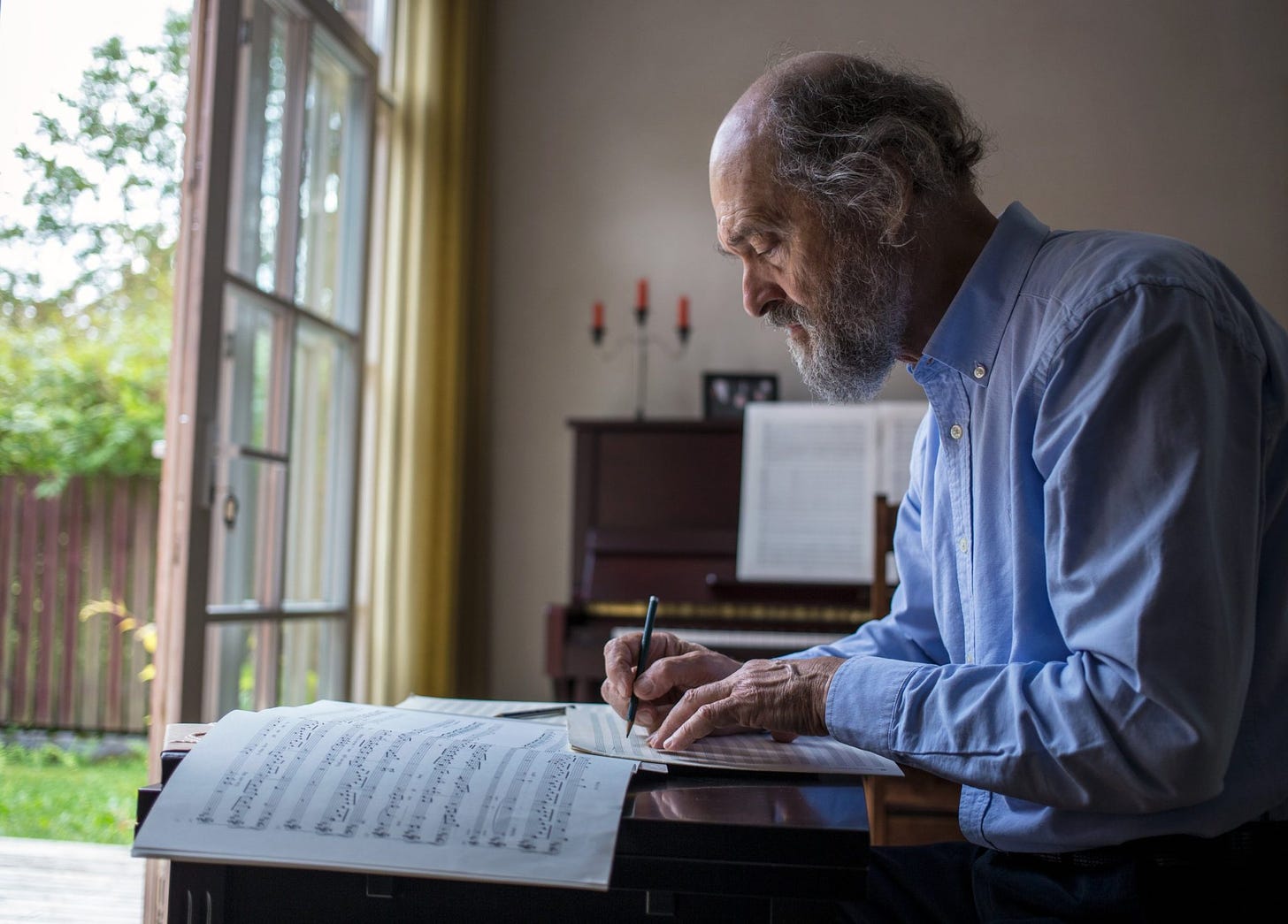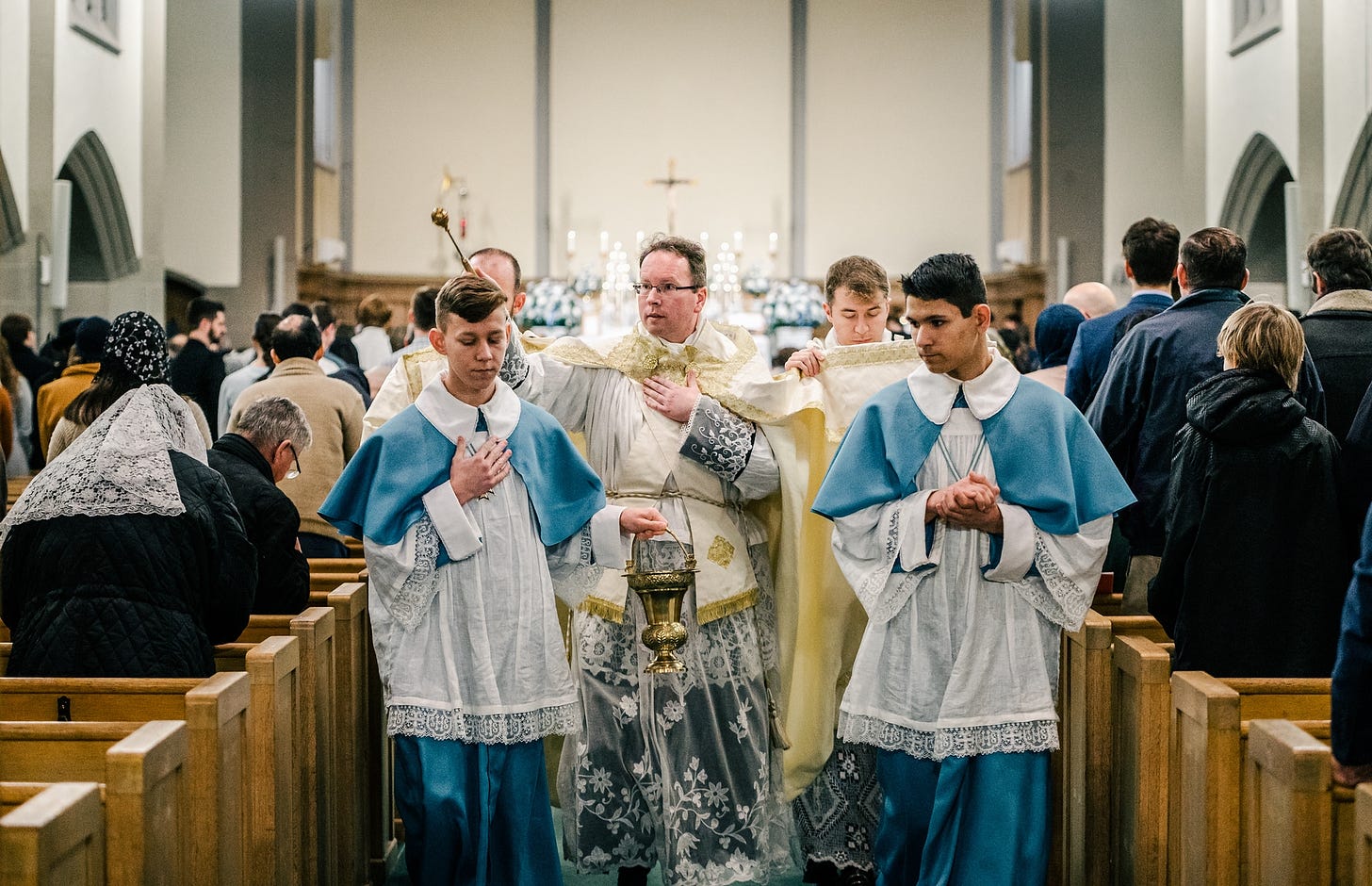The Need for Continual Purification as Basic Spiritual Attitude
The "Miserere" (Psalm 50) and Its Presence in Holy Week

All (sinners) are welcome
If one has no perception of sin and uncleanness before God, one can have no concept of a need for a savior. Salvation only makes sense when it is seen as healing for a wounded nature, purification for a corrupt or unclean condition. There is no way to understand the Gospel — the good news — without first knowing the bad news of our brokenness, our filthiness, our fallenness, our helplessness. This is the root of religion. Christ came to save us from our sins by His atoning sacrifice, by shedding for us His precious blood. He did not come to pass along some nice comfy stories or utter sagacious adages.
Here as in so many other areas, Nietzsche spoke with great clarity: “If the idea of God is removed, so is also the feeling of ‘sin’ as a trespass against divine laws, as a stain in a creature vowed to God.” Commenting on the all-too-familiar refrain nowadays that “all are welcome,” Bishop Rob Mutsaerts comments:
Isn’t everyone welcome in the Church? Certainly, yes. The only people who should stay at home are those who feel that there is nothing wrong with them and that they have no need of conversion. Apart from them, everyone is welcome. But there is one condition: that they come to repentance and appeal to God’s mercy. That is the whole point of religion, after all. It’s about recognizing that there is a standard — call it the truth — that has been revealed to us, and that you are not up to that standard. That is why you go to Church. To ask forgiveness, and to be strengthened by God’s grace, by using the means of grace: the sacraments, God’s Word, support from the faith community, so that you work more and more toward the sanctification of your life.
When Jesus protected the woman caught in adultery, we recall his clever strategy: he said whoever was without sin should be the first to cast a stone. The crowd dispersed, beginning with the oldest. These elderly folk must have been honest with themselves: they knew how many sins they had committed, perhaps some of them capital sins unknown to anyone else, and all of them displeasing to God. The younger folk in the crowd were not free of sin, either, but they were as yet lacking in self-knowledge and puffed up with a high opinion of their righteous aspirations, so they fingered the stones a bit longer before they, too, dropped them and walked off, stung in secret by the rabbi’s probing word.
Jesus knows what is in the heart of man (Jn 2:25), He knows the noisome uncleanness, the festering sin, the damp rot, the horror of godlessness. He knows it. He calls it out. He inspects it. He floodlights it. He offers to do something about it. He offers to pour His blood into our wounds, to water them back to health, and feed them with life. He came for sinners because of their sin, not their natural goodness streaming from His hand. Sin was, is, the implacable enemy of Christ — an enemy that withers before His accepted gaze and touch.
Wash me whiter than snow
For as long as I have been attending the classical Roman Rite of Mass, I have always loved the Asperges at High Mass on Sundays. It is simply a beautiful and fitting way to begin the liturgy, an act that is utterly and obviously ordered to preparing the people to worship in a more holy manner by recalling their minds to their baptism and by affording an occasion for the forgiveness of sins. The liturgy commences with an act of blessing, bestowed at the hands of the priest — a visible image of the showering of divine graces throughout our lives as Christians, and a foreshadowing of the sublime outpouring of grace in the Holy Sacrifice of the Mass and Holy Communion.
This Asperges ritual would not exist without a consciousness of sin. In the old covenant the victim’s blood was sprinkled for the remission of sins. In the new law the same holds, and the Asperges reminds us of that: “without the shedding of blood there is no forgiveness of sins” (Heb 9:22). Here it is chaste water, not turbid blood, that reminds us of our indebtedness to the saving death of Christ, but we know that the water of baptism has its power from the blood, even as the word of absolution does, and the liquid drops sprayed upon the congregation from the aspergillum recall Moses sprinkling the blood of the covenant on the people (Ex 24:8).
When the priest walks up and down the aisle, think of Moses… think of Jesus Christ, and what He has done for you. He has stooped to wash away your filth with His holy hands and the liquor of His blood, more cleansing than the freshest mountain streams. He exults in your beauty when you have been washed and dressed for the Father’s house.
Here is what the Schola sings (and, in many places, the people sing too):
Asperges me, Domine, hyssopo et mundabor,
Lavabis me, et super nivem dealbabor.
Miserere mei, Deus, secundum magnam misericordiam tuam.Thou shalt sprinkle me with hyssop, and I shall be cleansed:
Thou shalt wash me, and I shall be made whiter than snow.
Have mercy on me, O God, according to thy great mercy.
Why was this Asperges ritual removed from the Novus Ordo? Sure, you can point out that technically there is something a bit like it still buried amidst the options of the new missal. How often have you seen it done? In all my decades in the new Mass, I knew only one priest who used the “sprinkling rite.” And it was still a far cry from what the Church used to do — and still does, wherever the worship has not been severed from its roots.
Where do the words of the Asperges antiphon come from? Naturally, from the great penitential Psalm 50, called “the Miserere”: the psalm prayed by King David when repenting of his appalling sins of murder and adultery. Now there was someone who needed to be sprinkled; nay, who needed to be inundated and submerged. If God washes him, he will be clean — even of the murder of Uriah, even of the lust for Bathsheba. Whiter than snow. Great mercy. And Christ Himself counts David and Bathsheba among his ancestors (Mt 1:6).

The eightfold Miserere
I spent my Triduum last year with the Benedictine nuns in Gower, Missouri, and I will be heading there again this year, in just a few weeks’ time. I had visited their monastery a number of times in the past, but the last time had been over four years before, on the occasion of the sublime dedication of their new abbey church. It was time to go back again, to retreat from the world, to leave work behind (I had no computer or internet), and to immerse myself in the sacred liturgy. For the first time, I was able to assist at every liturgical office of the Triduum, from Tenebrae on Wednesday through Easter Sunday morning. To say it was beautiful would be a terrible understatement. It was truly the divine liturgy.
Whenever I throw myself into liturgy like this, I always notice lots of new things, or old things strike me in a new way. What was very new to me was the pre-55 custom of chanting the Miserere after every office of the day. That means, Psalm 50 is prayed eight times altogether: Prime, Terce, Sext, None, Vespers, Compline, and then Tenebrae, where it’s done twice — once as part of Lauds, and once after all is done. (Please, not “Psalm 51,” as modern-day Catholics hip to interreligious and ecumenical dialogue awkwardly say, but “Psalm 50,” as the Septuagint and the Vulgate have it and as every Father and Doctor of the Church knew it. Someday I will write about this business of misnumbering the Catholic psalms.)
The Miserere is one of the great texts of the Faith, alongside the Creed, the Te Deum, the Tantum ergo, the Victimae Paschali, and others of the sort. I sometimes think the entire life of prayer, repentance, humility, and wisdom is perfectly encapsulated in Psalm 50. If one could only pray this and mean every line of it, one would have prayed repentance, and obtained it.
At Gower, in my journal, I wrote the following under April 6, 2023:
This is the first time I’ve experienced the pre-55 custom of the Miserere being chanted at the end of each hour of the Office, starting (I think) with last night’s Tenebrae. And how fitting it seems: the repetition of this psalm drives home some of the most essential lessons of the Triduum. You can’t hide from them: the liturgy keeps putting the Miserere on your lips, over and over — here, repetition means saturation, confrontation, internalization.
After hearing the Miserere chanted recto tono about twenty times over the course of the Triduum, I nearly had it memorized. And the result of this repetition is that I carried the psalm around with me. It rose up in my mind without my willing it. A phrase, a verse, would assert itself as I drifted off to sleep, or in the middle of the night, or when I woke up in the morning. Is this what Sacrosanctum Concilium would have called “useless repetition”? Something “added without value”? It’s as good an example as any of the kind of thing they had in mind, but they were wrong. Let’s just admit it: the drafters of Sacrosanctum Concilium were small men with hollow chests who had grown tired of discipline and wanted to throw it off. I do not understand such people. I need discipline. Like most moderns, I am dying without it, and need it more than air.
No, this repetition of the Miserere is a most useful repetition. As I walked around the monastery grounds or down the long, empty gravel roads with freshly budding trees, I found phrases of Psalm 50 coming back to me… making me think, and pray…

Religious texts as roots of life
As Jeremy Holmes discusses in his masterful book Cur Deus Verba: Why the Word Became Words — a book that I consider the most important contribution to the theology of Scripture since St Augustine’s De Doctrina Christiana — it is far more important to have Scripture living within you, written on the fleshly tablet of the memory, than to have a thousand books of or about the Bible outside of you, in a library. And the only way the Bible will move from the outside to the inside is by sheer force of repetition, which drills it in and makes it consubstantial with the flesh.
Those who know me or who have read Good Music, Sacred Music, and Silence know that my favorite living composer is Arvo Pärt. One of the striking aspects of Pärt’s oeuvre is his steady reliance on classic religious texts for inspiration, whether he is composing a choral work using the words, or a symphonic work that mimics a vocal work (in some of his scores he will write the words he has in mind beneath the string section, even though one listening to it will never see or hear those words). In an interview, Pärt explained why he always chooses sacred texts even when his commission leaves him free to choose the words he will set to music:
I have always allowed myself to be guided by texts that mean a lot to me and that for me are of existential significance. It is a root that reaches very deep and that lifts me upwards. It is basically the same fruit that has nourished the world for centuries. If we view a period of two thousand years we recognise that people have changed very little. That is why I believe the sacred texts are still “contemporary.” Seen in this light there are not significant differences between yesterday, today, and tomorrow because there are truths that maintain their validity. Mankind feels much the same today as he did then and has the same need to free himself from his faults. The texts exist independently of us and are waiting for us: each of us has a time when he will find a way to them.1
Each of us has a time when he will find a way to them. I think the time when I found my way to Psalm 50 was April of 2023 in Gower. That was the grace of the Word.
And what power is lodged in this psalm, an endless inspiration to centuries of composers! Just think of the music the Miserere has inspired, from Gesualdo to Górecki, Allegri to Pärt! I do not expect all of my readers to have the time to listen to all of these settings, old and new, but I will include them here anyway for those who might wish to explore the vast range of musical responses that these divine words have evoked.
There is a reason why we pray, sing, read, call to mind the Miserere, again and again. For this is no useless repetition, but a persistent assault on the gates of the hard heart with the battering-ram of words of contrition. We may not mean them now, we may not mean them as well as we could, we may not even pay attention every time; but like the dripping water that drills through stone, our heart will give way to the insistent voice of pleading.
Enzo Restagno, with Leopold Brauneiss, et al., Arvo Pärt in Conversation, trans. Robert Crow (Champaign: Dalkey Archive Press, 2012), 55.






Thanks for letting everyone know about the eightfold Miserere. It is one of the absolute treasures of the liturgical year.
And as for being 'repetitive' in Latin it really isn't. If I had to recite the English translation of Psalm '51' found currently in the Liturgy of the Hours eight times in a day I really would feel oppressed, but the Latin is not so. It is musical and rhythmic and the words just roll right off the tongue.
Really the Latin Psalter of the West is something we should be giving a great deal more respect to. It is a historical monument, along with the Mass, that puts absolutely everything on the UNESCO world heritage list to shame yet for two hundred years our so called 'scholars' even some in the so called trad world today have just blown it off or tried to run it down.
We have something here that has been in continuous use in the West since the Roman Empire and is so old that we have no idea who the translator was. Saint Jerome just touched it up a little but not really all that much. Yet we ignore this great treasure and insist that some medieval manuscript produced by non Christians is a better option. Stupid.
“He offers to pour His blood into our wounds, to water them back to health, and feed them with life. He came for sinners because of their sin, not their natural goodness streaming from His hand. Sin was, is, the implacable enemy of Christ — an enemy that withers before His accepted gaze and touch.”
The wonder and mercy of Our Lord! That, “…when as yet we were sinners, …Christ died for us.” (Rom v. 8-9) We were His enemies and yet He laid down His life for us. We did not deserve anything from our sins and wickedness, but Our Lord—in His love—intervened for our salvation. As the Exsultet of the Easter Vigil will proclaim, “O Happy Fault! O truly necessary sin of Adam, that won for us so great a Saviour!”
All we can offer in exchange is our lives confirmed to His, our meager penances and sacrifices united to His Holy Cross, so that we may found like Him (Phil iii. 8-9). And all this only because He first loved us and made it possible by the shedding of His Precious Blood. For God works in us to bring us to salvation as we cooperate with His graces (Phil ii. 13). The Psalms—and their constant consumption via prayer and recitation—are a great way to keep the cyclic nature of the foretelling, the acting out, and the fruits of the Paschal Mystery ever in our minds and hearts.
Thank you, Lord Jesus. Thank you for purchasing our salvation in the Passion. A mercy we don’t deserve. Miserere mei Deus secundum magnum misericordiam tuam!